Follow the Prophets
SEARCH BY TITLE
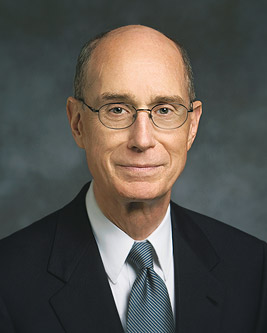 Finding Safety in Counsel
Finding Safety in Counsel
There seems to be no end to the Savior’s desire to lead us to safety. And there is constancy in the way He shows us the path. He calls by more than one means so that it will reach those willing to accept it. And those means always include sending the message by the mouths of His prophets whenever people have qualified to have the prophets of God among them. Those authorized servants are always charged with warning the people, telling them the way to safety. When tensions ran high in northern Missouri in the fall of 1838, the Prophet Joseph Smith called for all the Saints to gather to Far West for protection. Many were on isolated farms or in scattered settlements. He specifically counseled Jacob Haun, founder of a small settlement called Haun’s Mill. A record of that time includes this: “Brother Joseph had sent word by Haun, who owned the mill, to inform the brethren who were living there to leave and come to Far West, but Mr. Haun did not deliver the message”. Later, the Prophet Joseph recorded in his history: “Up to this day God had given me wisdom to save the people who took counsel. None had ever been killed who [had abided] by my counsel”. Then the Prophet recorded the sad truth that innocent lives could have been saved at Haun’s Mill had his counsel been received and followed. In our own time, we have been warned with counsel of where to find safety from sin and from sorrow. One of the keys to recognizing those warnings is that they are repeated. For instance, more than once in these general conferences, you have heard our prophet say that he would quote a preceding prophet and would therefore be a second witness and sometimes even a third. Each of us who has listened has heard President Kimball give counsel on the importance of a mother in the home and then heard President Benson quote him, and we have heard President Hinckley quote them both. The Apostle Paul wrote that “in the mouth of two or three witnesses shall every word be established”. One of the ways we may know that the warning is from the Lord is that the law of witnesses, authorized witnesses, has been invoked. When the words of prophets seem repetitive, that should rivet our attention and fill our hearts with gratitude to live in such a blessed time.
![ArtBook__134_134__EzraTaftBenson____[1]](http://ldsminds.com/wp-content/uploads/2013/10/ArtBook__134_134__EzraTaftBenson____1.jpg) Fourteen Fundamentals in Following the Prophet
Fourteen Fundamentals in Following the Prophet
Not only is the Church growing in number today, it is growing in faithfulness and, even more important, our young generation, as a group, is even more faithful than the older generation. God has reserved you for the eleventh hour—the great and dreadful day of the Lord. It will be your responsibility not only to help to carry the kingdom to a triumph but to save your own soul and strive to save those of your family and to honor the principles of the inspired constitution of the United States. To help you pass the crucial tests which lie ahead, I am going to give you today several aspects of a grand key which, if you will honor, will crown you with God’s glory and bring you out victorious in spite of Satan’s fury. . . Here then is the grand key—Follow the prophet—and here are fourteen fundamentals in following the prophet, the President of The Church of Jesus Christ of Latter-day Saints. First: The prophet is the only man who speaks for the Lord in everything. Second: The living prophet is more vital to us than the Standard Works. Third: The living prophet is more important to us than a dead prophet. Fourth: The prophet will never lead the Church astray. Fifth: The prophet is not required to have any particular earthly training or diplomas to speak on any subject or act on any matter at any time. Sixth: The prophet does not have to say “Thus saith the Lord” to give us scripture. Seventh: The prophet tells us what we need to know, not always what we want to know. Eighth: The Prophet is not limited by men’s reasoning. Ninth: The prophet can receive revelation on any matter—temporal or spiritual. Tenth: The prophet may well advise on civic matters. Eleventh: The two groups who have the greatest difficulty in following the prophet are the proud who are learned and the proud who are rich. Twelfth: The prophet will not necessarily be popular with the world or the worldly. Thirteenth: The prophet and his counselors make up the First Presidency—The highest quorum in the Church. Fourteenth: The prophet and the presidency—the living prophet and the First Presidency—follow them and be blessed—reject them and suffer. . . I testify that these fourteen fundamentals in following the living prophet are true. If we want to know how well we stand with the Lord then let us ask ourselves how well we stand with His mortal captain—how close do our lives harmonize with the Lord’s anointed—the living Prophet—President of the Church, and with the Quorum of the First Presidency.
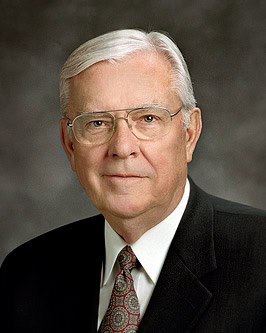 Hyrum Smith: “Firm As the Pillars of Heaven”
Hyrum Smith: “Firm As the Pillars of Heaven”
This blessing identified Hyrum’s strongest characteristic. More than anything else, he was “firm as the pillars of heaven.” Throughout Hyrum’s life, the forces of evil combined against him in an attempt to defeat him or at least to prompt him to stray off course. After his older brother Alvin’s death in 1823, Hyrum bore significant responsibility in the Smith family. At the same time, he assisted and served his brother, Joseph the Prophet, throughout the long and arduous process of the Restoration. Ultimately, he joined Joseph and other martyrs of past gospel dispensations. His blood was shed as his final testimony to the world. Through it all, Hyrum stood firm. He knew the course his life would take, and he consciously chose to follow it. To Joseph, Hyrum became companion, protector, provider, confidant, and eventually joined him as a martyr. Unjust persecution engulfed them throughout their lives. Although he was older, Hyrum recognized his brother’s divine mantle. While he gave Joseph strong counsel on occasion, Hyrum always deferred to his younger brother. Speaking to his brother, Joseph once said, “Brother Hyrum, what a faithful heart you have got! Oh may the Eternal Jehovah crown eternal blessings upon your head, as a reward for the care you have had for my soul! O how many are the sorrows we have shared together.” On another occasion, Joseph referred to his brother with these profound and tender words: “I love him with that love that is stronger than death.”
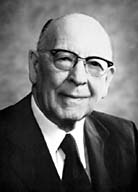 In the Mountain of the Lord’s House
In the Mountain of the Lord’s House
Last Friday in our meeting of the Regional Representatives of the Twelve, Brother Marion D. Hanks, who, as you know, is such a wonderful storyteller, as we witnessed again this morning, gave this illustration in talking to the brethren. He said that the old leaves have to fall from the trees to make room for the new leaves to come. I applied that to myself. I am one of the old leaves in this church. I am one of the oldest men. I think I can truthfully say that there is no other living man on the face of the earth today who has stood at this pulpit as many times as I have in a general conference of this church except President Joseph Fielding Smith. If I figure correctly, this is the seventy-fourth general conference in which I have been privileged to speak. As I listen to the testimonies of my brethren, there come to me the words of the song that we sing: “Come, listen to a prophet’s voice, And hear the word of God, And in the way of truth rejoice,And sing for joy aloud. We’ve found the way the prophets went Who lived in days of yore; Another prophet now is sent This knowledge to restore.” —Hymns, No. 46. I wonder where in all this world men could go today and listen to such sermons as we have heard here, which will exalt men and women in bringing them happiness in this life and eternal exaltation in the world to come, with their loved ones and with the sanctified and redeemed of our Father’s children. Then I think of the words of Jeremiah of old. He saw our day. He said: “Turn, O backsliding children, saith the Lord; for I am married unto you. …” What a covenant! “… And I will take you one of a city, and two of a family, and I will bring you to Zion: And I will give you pastors according to mine heart, which shall feed you with knowledge and understanding.” Where could you go in all the world today and find a fulfillment of that statement as we have witnessed during the sessions of this conference? Then I think of the statement in the Articles of Faith, given to us by the Prophet Joseph Smith, when he said: “We believe the Bible to be the word of God as far as it is translated correctly; we also believe the Book of Mormon to be the word of God.” That I believe with all my heart, and I thank God for these volumes of scripture. And then I think of the words of another of our Articles of Faith, which reads like this: “We believe all that God has revealed, all that He does now reveal, and we believe that He will yet reveal many great and important things pertaining to the Kingdom of God.” That I believe with all my heart. I love to study the prophecies of the scriptures. Many of them have found their fulfillment in this the dispensation of the fulness of times, and others await their fulfillment.
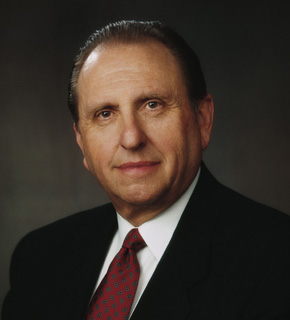 Let Him Be Humble
Let Him Be Humble
I think of a little sister, a French-Canadian sister, whose life was changed by the missionaries as her spirit was touched as she said good-bye to me and my wife two years ago in Quebec. She said, “President Monson, I may never see the prophet. I may never hear the prophet. But President, far better, now that I am a member of this Church, I can obey the prophet.” My sincere prayer today, President McKay, is that I might always obey you and these, my brethren. I pledge my life, all that I may have. I will strive to the utmost of my ability to be what you would want me to be. I am grateful for the words of Jesus Christ, our Savior, when he said: “I stand at the door and knock. If any man hear my voice and open the door, I will come in to him. . . .” I earnestly pray, my brothers and sisters, that my life might merit this promise from our Savior.
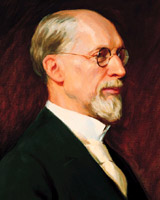 May We So Conduct Our Lives
May We So Conduct Our Lives
We are considered by the world a peculiar people. By the unbeliever, the members of the Church of Christ in all ages of the world have been considered a peculiar people. When the Lord has spoken through His servants, there have been at different periods of time people in the earth who have said, “I do not believe in revelation.” This age is no exception to the rule. The thousands, aye, the millions, of our Father’s children who live in the earth are but repeating the history of the past when they deny that God has revealed again His will to the children of men, and say that they have no need of any further revelation. To demonstrate this we may refer to the experiences of the people in the days of Noah. Noah was a prophet of the living God, inspired with a desire to save the souls of the children of men. He had no disposition to destroy those who lived around him, but, receiving a commandment from our Father in heaven, he warned the people to repent of their evil ways, and declared that unless they did repent, destruction would follow and our Heavenly Father would visit them with His displeasure. What was the result? They said to Noah, “What right have you to instruct us? Who are you that you come and speak to us in the name of the Lord? You are only a man like other men.” And they rejected his testimony, not because it was untrue, but because they would not believe it, not possessing the spirit which he possessed. Then the Lord told him to build an ark, and to gather therein those who believed his message, and then He would visit His displeasure upon the inhabitants of the earth. It was not because Noah had said these things that the deluge came; it was because Almighty God had spoken through him to the people. When our Father in heaven speaks to the world, no matter how feeble or weak the servant may be who carries the message, that word will be vindicated, even if it involves the destruction of many souls. You no doubt remember the experience of Jonah when he was called to warn the people of Nineveh. Our Father in heaven commanded him to go and call them to repentance. He tried to avoid this responsibility, and it resulted in his being thrown into the ocean. But the same power that had called him to this mission preserved his life, and rebuked him for avoiding what was his plain duty. Then he went and warned the people of Nineveh, and they repented in sackcloth and ashes. You will remember the Lord promised that if they did not repent they would be punished; but they did repent, and He removed from them the curse that otherwise would have been visited upon them for the violation–of what? Not because they failed to listen to Jonah as a man, but because they failed to heed Jonah, the prophet of God, And when they did listen to the voice of the Lord through that inspired man, they received a blessing instead of a cursing.
 Principles from Prophets
Principles from Prophets
Just last Thursday I was sitting in the room in the Salt Lake Temple where the First Presidency and Quorum of the Twelve meet once each week. I gazed up at the wall which faces the First Presidency, and there I observed a portrait of each President of the Church. As my gaze moved from the Prophet Joseph right down through President Hinckley, I thought, “We have had great Presidents of this Church. Each one has guided us; his writings have stimulated us; his messages have inspired us. To show us the way, we have those whom the Lord has provided.” Some years ago I spoke here of the Presidents of the Church I have known, giving brief personal glimpses. Today I would like to mention each one in greater depth. . . What can we learn from the prophets whom I have known and about whom I have visited with you today? We can learn that they never wavered, never faltered, never failed; that they are men of God. May we be persistent in those things which are good and noble. May we ever stay safely on the Lord’s side of the line. May we be considerate, studious, and responsive to the whisperings of the Holy Spirit. May we be dedicated to the gospel of Jesus Christ. May we love one another and always look for the best in people. May we do our best in all that we do. God bless you, my dear young friends. Remember that there is another whom you can follow—even the Lord Jesus Christ. He said, “Come, follow me.” Let us follow Him. He has sent Presidents of the Church, whom we can have as guides and whom we can follow. He Himself extended that kind, generous, personal invitation when He said, “Behold, I stand at the door, and knock: if any man hear my voice, and open the door, I will come in to him.” As the sixteenth President of the Church, my story is yet to be summarized by those who will follow. In the meantime, I pledge my life, my strength—all that I have to offer—in serving the Lord and in directing the affairs of His Church in accordance with His will and by His inspiration. I invoke His blessings upon you. I bless you that you may follow the teachings of prophets, that your lives may thereby be enriched.
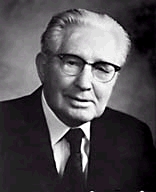 Profile of a Prophet
Profile of a Prophet
Perhaps I can do this more quickly by referring to an interview I had in London, England, in 1939, just before the outbreak of the war. I had met a very prominent English gentleman, a member of the House of Commons, formerly one of the justices of the supreme court of England. In my conversations with this gentleman on various subjects—“vexations of the soul,” he called them—we talked about business, law, politics, international relations, and war, and we frequently discussed religion. He called me on the phone one day and asked if I would meet him at his office and explain some phases of the gospel. He said, “I think there is going to be a war. If there is, you will have to return to America and we may not meet again.” His statement regarding the imminence of war and the possibility that we would not meet again proved to be prophetic. When I went to his office he said he was intrigued by some things I had told him. . . We agreed between us that the following characteristics should distinguish a man who claims to be a prophet: 1. He will boldly claim that God had spoken to him. 2. Any man so claiming would be a dignified man with a dignified message—no table jumping, no whisperings from the dead, no clairvoyance, but an intelligent statement of truth. 3. Any man claiming to be a prophet of God would declare his message without any fear and without making any weak concessions to public opinion. 4. If he were speaking for God he could not make concessions, although what he taught would be new and contrary to the accepted teachings of the day. A prophet bears witness to what he has seen and heard and seldom tries to make a case by argument. His message and not himself is important. 5. Such a man would speak in the name of the Lord, saying, “Thus said the Lord,” as did Moses, Joshua, and others.6. Such a man would predict future events in the name of the Lord, and they would come to pass, as did those predicted by Isaiah and Ezekiel. 7. He would have not only an important message for his time but often a message for all future time, such as Daniel, Jeremiah, and others had. 8. He would have courage and faith enough to endure persecution and to give his life, if need be, for the cause he espoused, such as Peter, James, Paul, and others did. 9. Such a man would denounce wickedness fearlessly. He would generally be rejected or persecuted by the people of his time, but later generations and descendants of his persecutors would build monuments in his honor. 10. He would be able to do superhuman things—things that no man could do without God’s help. The consequence or result of his message and work would be convincing evidence of his prophetic calling: “By their fruits ye shall know them”. 11. His teachings would be in strict conformity with scripture, and his words and his writings would become scripture. “For the prophecy came not in old time by the will of man: but holy men of God spake as they were moved by the Holy Ghost”. Now I have given but an outline that you can fill in and amplify and then measure and judge the Prophet Joseph Smith by the work and stature of other prophets.
